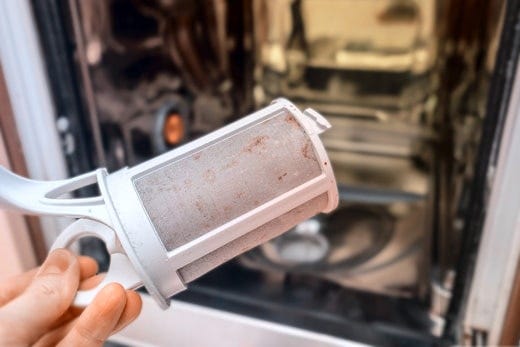Potential Damage to Delicate Items: Delicate items, such as glassware or ceramics, may be damaged by direct contact with concentrated detergent. The harsh chemicals in the detergent can dissolve delicate surfaces, leading to irreversible damage.
2. AVOID TOUCHING DETERGENT TABS WITH WET HANDS
- Premature Dissolution: Avoid handling dishwasher tablets with wet or damp hands, as moisture can cause them to dissolve prematurely.
- Difficulty in Handling: Wet hands may make it challenging to grip and handle the tablets or pods effectively. This can lead to dropping or mishandling them, resulting in spillage or waste.
- Residue on Hands: Handling detergent tablets or pods with wet hands can leave behind residue on your skin. This residue may contain harsh chemicals found in dishwasher detergents, which can potentially irritate or dry out your skin.
3. DON’T USE DISHWASHER DETERGENT AS DISHWASHING SOAP
- Foaming Hazard: One of the immediate risks of using dishwasher detergent in the sink is the potential for excessive foaming. Unlike dishwashing soap, dishwasher detergent is not formulated to produce manageable foams when agitated in water. This can quickly lead to an overflow of bubbles, creating a messy and challenging situation to control.
- Not meant for hands: The harsh chemicals in dishwasher detergent can irritate your skin. Dish soap is milder and gentler on hands.
4. DON’T USE TOO MUCH DETERGENT
- When it comes to detergent, it seems logical that more products would clean better, but this isn’t the case. Too much detergent can leave residue on dishes, and dishes with detergent residue are pretty unattractive and could even be unsafe to eat from.
5. DON’T STORE POWDER DETERGENT IN HUMID ENVIRONMENTS
- Moisture Absorption: Powder detergent is highly susceptible to moisture absorption due to its composition. When exposed to humid environments, such as bathrooms or damp storage areas, the detergent can absorb moisture from the air, causing it to clump together and form hardened lumps. This makes it challenging to measure and dispense the appropriate amount of detergent for each load of dishes, leading to wastage and inefficient cleaning.
- Store it dry: Keep your powder detergent in a cool, dry place, ideally away from sources of moisture like laundry rooms or bathrooms.
- Airtight container: Consider transferring the powder to an airtight container for extra protection against humidity. Just be sure the original container is resealable if you choose not to transfer it.
Choosing the Right Dishwasher Detergent
With various types available, choosing the right detergent can feel overwhelming. Here's a breakdown of the most common options:
- Water Hardness: Offer a good balance of convenience and effectiveness. Choose a detergent formulated for your water hardness level to prevent mineral buildup on dishes and inside the dishwasher.
- Dishwasher Model: Some dishwashers require specific types of detergent to maintain warranty coverage and optimal performance.
- Cleaning Needs: If you Pre-Rinsing vs. Scraping: Frequently wash heavily soiled dishes or cookware, opt for a detergent with enhanced stain-fighting properties.
Tips for Effective Dishwashing
- Pre-Rinsing VS Scraping: Pre-rinsing dishes before loading them into the dishwasher wastes water and energy. Ensure water can reach all surfaces by leaving enough space between dishes. Instead, scrape off large food particles and spoilage and let the dishwasher handle the rest. Consult your dishwasher manual for proper loading techniques.
